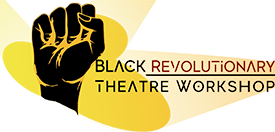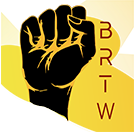BRTW Salutes Audre Lorde
Poet, Essayist, Professor, Activist
Listen to “BHM Heroes Ep 6: Audre Lorde” on Spreaker.
Podcast episode transcript below:
Hey Revolutionaries! This is Heather Harvey, Black Revolutionary Theatre Workshop Co-founder and Producing Ensemble Member. Welcome to BRTW’s Black History Month Heroes. Every day throughout the month of February we’ll be telling you about the black folks who inspire us to be better, badder, and more revolutionary.
Who’s today’s hero? Well, I’ll give you a hint if you didn’t look at the title. “The Master’s Tools Will Never Dismantle the Master’s House.” Everyone’s favorite Facebook quote is attributable to the one and only, Audre Lorde.
Poet, essayist, activist, and librarian, Audre Lorde is one of those notable figures many of us come to love in college. Whether it’s for her beautiful prose, emotional lyricism, or the ways in which she pushed the fight for Black women forward, Audre Lorde challenged the accepted norms of nearly every field she occupied.
Lorde was born to 2 Caribbean immigrants in New York City in 1934. Her mother taught her to read nearly as soon as she taught her to talk. As a child, Lorde decided to drop the “y” from her first name, preferring the visual symmetry of 2 e-ending names together. She also began writing poetry, and her strained relationship with her parents would work its way into her later writings. She became so infatuated with poetry that she began using poems to communicate. She committed several poems to memory and would often recite them to share how she was feeling in everyday conversation.
Audre Lorde’s early love of poetry would only grow over time. Even as she later became involved in civil rights and women’s rights, Lorde would always contend that language was a powerful form of resistance and encouraged people to opt for their own words over violence in the fight against oppression.
At 15, she published her first poem in Seventeen after her high school rejected it for being “inappropriate.” Lorde graduated from high school in 1951. She graduated from Hunter College in 1959. She continued writing poetry and became increasingly involved in the Greenwich Village gay scene. During this time, she also began working as a librarian, and she continued her studies at Columbia University, where she earned a Masters in Library Science in 1961. After graduating, she continued her commitment to her artistry and began finding her footing as an activist, as well.
Her poems were regularly published throughout the 60s. And in 1968, she published her first volume of poetry, The First Cities. As an activist within the civil rights, anti-war, and feminist movements, her poetry deftly handled the differences between communities and cultures but also within. She discussed the tension between race, gender, sexuality, and nation that still inspires writers today. As a writer in residence at Tougaloo College, she completed the work that would become her second published volume of poetry, Cables to Rage, which publicly confirmed that Lorde was a lesbian for the first time. Her various identities- activist, lesbian, poet- were not always easy to juggle, and her volume From a Land Where Other People Live, dealt with her own identity struggles and the anger she contended with within various social justice movements. In 1973, she was nominated for a National Book Award for this work and, by 1976, Lorde became a prominent fixture in the Black Arts Movement with one of her most famous works, Coal.
Throughout this time, she also taught English at Lehman College, John Jay, and Hunter College. While at John Jay, she fought for a Black Studies department. In the mid 1970s, Lorde was diagnosed with breast cancer and underwent a mastectomy in 1978. In 1980, she co-founded Kitchen Table: Women of Color press, the first US publisher for women of color. In 1981, she co-founded the Women’s Coalition of St. Croix, which assisted survivors of intimate partner violence. She also helped found the Sisterhood in Support of Sisters in South Africa, to assist women impacted by apartheid.
During the 1980s, Lorde also published a series of essays, including The Cancer Journals about her experience with cancer including her then-recent liver cancer diagnosis, Zami: A New Spelling of My Name, and Sister Outsider, from which we got the quote at the beginning of this podcast. The latter 2, in particular, have become cornerstone works in many Black gender and sexuality courses. Her theories about the way in which we oversimplify gender differences, find power in language, and need to embrace difference to find power continue to impact the way we discuss social justice and write about it to this day. Perhaps most notably today, we continue to revisit Lorde’s work confronting racism within feminism as a driving force to forge a more intersectional feminist space in the modern feminist movement.
In 1984, Lorde obtained a visiting professorship in West Berlin at the Free University of Berlin. While there, she helped start the Afro-German movement. In 1991, she became the New York State poet laureate. She received the Whitehead Lifetime Achievement Award from Publishing Triangle in 1992. Later that year, Audre Lorde died of liver cancer at the age of 58 in St. Croix. Before dying, she changed her name to Gamba Adisa, which means Warrior: She Makes Her Meaning Known.
The Dagmar Schultz film “Audre Lorde: The Berlin Years 1984-1992” highlights her time and significant impact while working in Germany. In addition to this documentary, Lorde’s work continues to be celebrated in the “Callen Lorde Community Health Center,” “The Audre Lorde Project,” the “The Audre Lorde Award,” as well as the countless works she continues to inspire.
BRTW salutes Audre Lorde for her comprehensive and powerful impact on the arts, social justice, and spurring us all forward to make our meaning known.
Thank you for listening to today’s BHM Hero by Black Revolutionary Theatre Workshop!
We have a few upcoming events if you’d like to be Black and badass with us in person. First, Ensemble Member, Sheyenne Javonne Brown wrote an amazing play called Summoned which explores Black love and fidelity as we balance our commitments to activism and career. You can catch the semi-staged reading at Theatre for the New City on Monday, February 26 @ 7pm. And you can get tipsy while you learn you Black History with us on Friday February 23 and Saturday February 24. We’re going to bring the Black History Month Heroes to the stage for a slightly raucous good time.
You can support Black Revolutionary Theatre Workshop and stay up to date with our work by following us online. We’re on Facebook @BlackRevolutionaryTheatreWorkshop and Twitter & Instagram @TheBRTW. You can subscribe to our e-letter on our website, BlackRevolutionaryTheatreWorkshop.org.
And most importantly, our work is expensive to create, so if you want to support us, you can make a one-time or monthly recurring donation on our website. BRTW is fiscally sponsored by Fractured Atlas, and your donation is tax-deductible to the extent permitted by law.
Tune in tomorrow for another BHM hero. PEACE!
Don’t Miss BRTW’S
Live Black History Month Heroes Celebration
Friday 2.23.18 & Saturday 2.24.18 from 8:00 – 9:30 pm
353 Studios in Manhattan
There will be booze, Black history, and bad-assery



